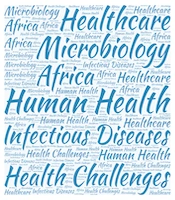Dear Editor,
Microbiology, the study of microscopic organisms, has emerged as a pivotal field of scientific inquiry in the 21st century (1). This branch of science plays an indispensable role across various sectors, including healthcare, agriculture, environmental science, and biotechnology (1). In African countries, microbiology faces distinctive challenges that can impede its progress and potential contributions to society (2, 3). This article explored the role of microbiology in the 21st century and illuminated the challenges confronting microbiology professionals in African nations.
Microbiology encompasses the comprehensive study of microorganisms such as bacteria, viruses, fungi, and parasites (4). These organisms exert significant influence on human health, food production, environmental sustainability, and biotechnological advancements (5-8). Microbiology professionals stand at the forefront of comprehending, combating, and harnessing the power of microorganisms.
In healthcare, microbiologists play a pivotal role in identifying and managing infectious diseases. They collaborate closely with healthcare providers to pinpoint pathogenic microorganisms, devise diagnostic tests, and formulate effective treatment strategies (9, 10). Moreover, microbiologists contribute to the development of vaccines, antibiotics, and antiviral drugs (11).
Microbiology also occupies a central position in agriculture (12). Microbiologists investigate the intricate relationships among microorganisms, plants, animals, and the environment. They explore methodologies to augment crop yields, pioneer sustainable farming practices, and address food safety concerns (8). Additionally, microbiologists play a significant role in the production of biofuels, bioplastics, and other biotechnological advancements that promote a greener future (13, 14).
One of the primary challenges faced by microbiology professionals in African countries is the pressing need for enhanced infrastructure and resources (15). Many laboratories lack the essential equipment, reagents, and cutting-edge technology necessary for conducting advanced research. This scarcity significantly hampers their ability to perform experiments, diagnose diseases, and contribute to scientific progress. There is an urgent requirement for increased funding to support African microbiology professionals (15). Limited financial resources not only constrain research opportunities but also hinder the acquisition of state-of-the-art equipment and impede collaboration with international partners. Without adequate funding, the potential for groundbreaking discoveries and advancements in microbiology remains largely unrealized.
Furthermore, African countries frequently grapple with the issue of brain drain, as talented microbiology professionals often seek better opportunities abroad (16, 17). The allure of better pay, infrastructure, and career prospects can result in a drain of skilled individuals, detrimentally impacting the growth of the field within the continent. Retaining and attracting talent in microbiology is paramount for progress in the field.
Collaboration and networking are pivotal for scientific advancement. However, there is a pressing need for more platforms facilitating knowledge-sharing and networking opportunities to bolster microbiology growth in African countries (18, 19). Establishing robust collaborations between research institutions, universities, and industries within Africa and internationally can catalyze scientific advancements.
Microbiology professionals in African countries often lack public awareness and recognition of the field's significance. This lack of awareness can foster misconceptions, hindering public support and funding for microbiology research (1, 20). Promoting public understanding and appreciation of microbiology can significantly contribute to its growth and recognition.
Microbiology, with its vast potential, stands as a beacon of hope in confronting the multifaceted challenges that African countries grapple with, ranging from the relentless onslaught of infectious diseases to the urgent need for bolstering food security and safeguarding environmental sustainability. Nevertheless, professionals within this dynamic field are confronted by a daunting array of obstacles, including the pervasive specter of resource limitations, the stifling constraints of inadequate funding, the insidious drain of talent abroad, and the lamentable dearth of collaborative opportunities and recognition. To overcome these formidable barriers and fully unleash the transformative power of microbiology, it is imperative that governments, institutions, and stakeholders alike prioritize substantial investments in microbiological research, fortify essential infrastructure, and invigorate educational initiatives. By cultivating an ecosystem that nurtures and empowers microbiology professionals, African nations can harness the intrinsic capabilities of this discipline to address societal needs comprehensively and propel scientific progress inexorably forward into the 21st century and beyond. Looking towards the horizon, sustained commitment and support for microbiology will not only facilitate the resolution of current challenges but also catalyze innovation, leading to the development of groundbreaking solutions for emerging issues. Thus, as we envision a future shaped by the dynamic interplay of science and society, it is abundantly clear that microbiology will continue to play a pivotal role in shaping a more prosperous and sustainable future for Africa and its diverse populace.
In understanding microbiology's role in addressing challenges in African countries, it's crucial to note limitations in this study. Firstly, generalization poses a challenge, as each nation has unique socio-economic and environmental contexts. Limited data availability constrains analysis, potentially hindering comprehensive insights. The study's scope may overlook emerging challenges or alternative perspectives. Bias in source selection may influence interpretations, affecting credibility. Additionally, the long-term impacts of proposed solutions may be inadequately explored. Implementing recommendations faces practical challenges, including political barriers and institutional capacity limitations. Acknowledging these limitations ensures transparency and rigor in the research process, though overcoming them remains a crucial endeavor.
